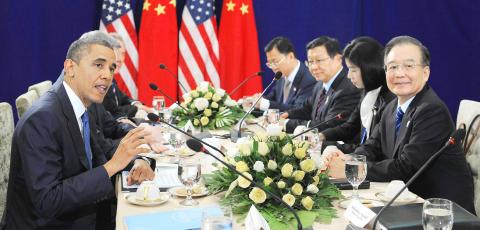US President Barack Obama urged Asian leaders to rein in tensions in the South China Sea and other disputed territories, but stopped short of firmly backing allies Japan, Vietnam and the Philippines in their disputes with China.
The comments by Obama at a regional summit meeting illustrate how he intends to manage Sino-US ties that have become more fraught across a range of issues, including trade, commercial espionage and the territorial disputes between Beijing and Washington’s Asian allies.
“President Obama’s message is there needs to be a reduction of the tensions,” US Deputy National Security Adviser Ben Rhodes said after the East Asia Summit in the Cambodian capital Phnom Penh.

Photo: AFP
Also present at the summit were leaders from China, Japan, 10-member ASEAN, India, South Korea, Australia and New Zealand.
“There is no reason to risk any potential escalation, particularly when you have two of the world’s largest economies — China and Japan — associated with some of those disputes,” Rhodes said.
That diplomatic response comes at the end of a three-day trip by Obama to old US ally Thailand, new friend Myanmar and China ally Cambodia.
In his first meeting with a Chinese leader since his re-election, Obama said Washington and its chief economic rival must work together to “establish clear rules of the road” for trade and investment.
“It is very important, that as two of the largest economies in the world, that we work to establish clear rules of the road internationally for trade and investment,” Obama told Chinese Premier Wen Jiabao (溫家寶).
However, the US president stopped short of accusing China of violating those rules.
During the US presidential election, Obama accused his rival, Mitt Romney, of shipping US jobs to China when he was a businessman. Romney, in turn, denounced Obama for being “a near-supplicant to Beijing” on trade, human rights and security.
In Asia, those trade tensions overlap with friction over Chinese sovereignty claims on disputed islands. On Monday, the Philippines accused summit host Cambodia of trying to stifle discussions on the South China Sea, where Chinese claims overlap with those of ASEAN members the Philippines, Vietnam, Malaysia and Brunei, as well as Taiwan.
“I’m committed to working with China and I’m committed to working with Asia,” Obama said.
China and the US had a “special responsibility” to lead the way on sustained global growth, he added.
Wen highlighted “the differences and disagreements between us,” but said these could be resolved through trade and investment.
Japanese Prime Minister Yoshihiko Noda said mounting Asian security problems raise the importance of the US-Japan alliance, a veiled reference to tensions over Chinese sovereignty claims and maritime disputes.
“With the increasing severity of the security environment in East Asia, the importance of the Japan-US alliance is increasing,” Noda told Obama.

NATIONAL SECURITY THREAT: An official said that Guan Guan’s comments had gone beyond the threshold of free speech, as she advocated for the destruction of the ROC China-born media influencer Guan Guan’s (關關) residency permit has been revoked for repeatedly posting pro-China content that threatens national security, the National Immigration Agency said yesterday. Guan Guan has said many controversial things in her videos posted to Douyin (抖音), including “the red flag will soon be painted all over Taiwan” and “Taiwan is an inseparable part of China,” while expressing hope for expedited “reunification.” The agency received multiple reports alleging that Guan Guan had advocated for armed reunification last year. After investigating, the agency last month issued a notice requiring her to appear and account for her actions. Guan Guan appeared as required,

Japan and the Philippines yesterday signed a defense pact that would allow the tax-free provision of ammunition, fuel, food and other necessities when their forces stage joint training to boost deterrence against China’s growing aggression in the region and to bolster their preparation for natural disasters. Japan has faced increasing political, trade and security tensions with China, which was angered by Japanese Prime Minister Sanae Takaichi’s remark that a Chinese attack on Taiwan would be a survival-threatening situation for Japan, triggering a military response. Japan and the Philippines have also had separate territorial conflicts with Beijing in the East and South China

A strong cold air mass is expected to arrive tonight, bringing a change in weather and a drop in temperature, the Central Weather Administration (CWA) said. The coldest time would be early on Thursday morning, with temperatures in some areas dipping as low as 8°C, it said. Daytime highs yesterday were 22°C to 24°C in northern and eastern Taiwan, and about 25°C to 28°C in the central and southern regions, it said. However, nighttime lows would dip to about 15°C to 16°C in central and northern Taiwan as well as the northeast, and 17°C to 19°C elsewhere, it said. Tropical Storm Nokaen, currently

PAPERS, PLEASE: The gang exploited the high value of the passports, selling them at inflated prices to Chinese buyers, who would treat them as ‘invisibility cloaks’ The Yilan District Court has handed four members of a syndicate prison terms ranging from one year and two months to two years and two months for their involvement in a scheme to purchase Taiwanese passports and resell them abroad at a massive markup. A Chinese human smuggling syndicate purchased Taiwanese passports through local criminal networks, exploiting the passports’ visa-free travel privileges to turn a profit of more than 20 times the original price, the court said. Such criminal organizations enable people to impersonate Taiwanese when entering and exiting Taiwan and other countries, undermining social order and the credibility of the nation’s